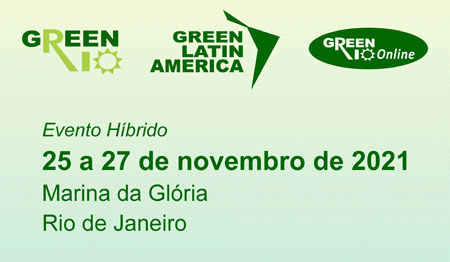On October 7, 2013, the Seminar ‘Cultivating Good Water/Itaipu’ was held at the Americas Society / Council of the Americas in New York. It was organized by Planeta Orgânico with the support of the Brazilian Consulate in New York.
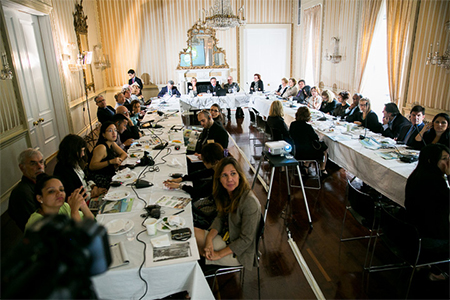
Over 50 people attended the event, at which the following were represented: Columbia University, Hunter College, Pace University, Fordham Business School, diplomats, entrepreneurs, the media, the Brazil-United States Chamber of Commerce, UNESCO, Africa Global Communication, ABC Group, Clinton Global Initiative, JPMorgan, Pricewaterhouse, and the New York Municipal Government. Sylvia Wachsner, representing the National Agricultural Society, also honored us with her presence at the event.
Randy Melzi, the Director for Public Policies and Corporate Relations of the Americas Society / Council of the Americas, welcomed those present and opened the event, highlighting the interest of the Americas Society/ Council of the Americas in themes related to sustainability, especially the theme of WATER.
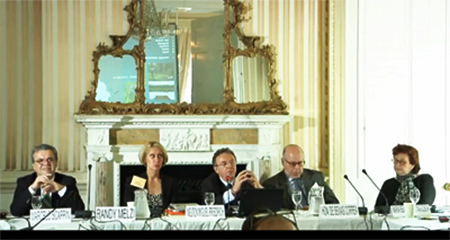
Next, Ambassador Felipe de Seixas Corrêa, the Brazilian Consul General in New York, spoke about the strategic and political importance of Itaipu, especially the ‘Cultivating Good Water’ Program, which promotes social inclusion and environmental responsibility.
Ambassador Seixas Corrêa pointed out that Brazil is a leading global player in the sustainability issue. The country hosted the Eco 92 conference, and more recently the Rio+20 event; and in this context, the ‘Cultivating Good Water’ program has been one of our best examples.
After Ambassador Seixas Corrêa, Maria Beatriz Martins Costa, director of Planeta Orgânico, addressed the audience, presenting an overview of Brazil’s current scenario, with emphasis on the social mobility that has occurred in the last 10 years, when 28 million people rose above the poverty line and 29 million people rose to the middle class. Maria Beatriz also stressed that Brazil is one of the “mega-diverse” countries, and its biodiversity is the largest in the planet.
The policies implemented in relation to sustainable purchases and school meals have induced good practices, which promote social inclusion and income generation.
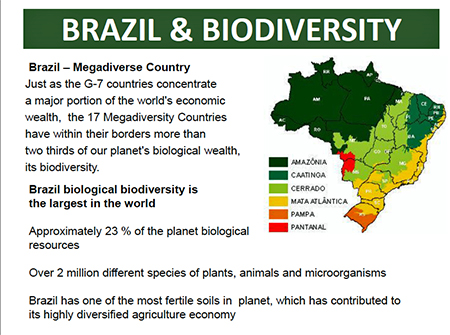
Nelton Friedrich, Itaipu’s Coordination and Environment Director, started his presentation by telling the story of the ‘Cultivating Good Water’ program, pointing out that in 2003 Itaipu changed its mission, when besides generating quality electric power, Itaipu undertook a commitment to social and environmental responsibility, “boosting sustainable economic, touristic and technological development both in Brazil and in Paraguay.”
Nelton showed a videotape that gives an overview of the actions promoted by the ‘Cultivating Good Water’ program, from restoring micro-basins to using organic products in school meals, and including the climate issue and renewable energy. The restoration of micro-basins had a great impact on the region’s flora and fauna; bees were able to return, and today the region produces honey.
After the videotape, Nelton explained that the ‘Cultivating Good Water’ program involves a portfolio of 20 programs encompassing 65 projects, which are interconnected and jointly structured with the participation of society, engaging the governments of the 29 municipalities located in the Paraná 3 Basin, as well as universities, entities, companies, cooperatives, NGOs and pertinent public bodies, in a process that combines technical and scientific knowledge, popular wisdom and integrated action.
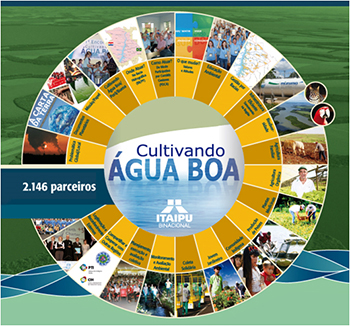
In addition to all these projects, Nelton made a point of mentioning that there are already several municipalities included in the ‘Cultivating Good Water’ program that are also committed to the global ‘Sustainable Towns’ initiative, adding that one of the main areas that is receiving attention is the need for basic water and sewerage services.
Before the question and answer session, Nelton asked Minister Marcelo Ricciardi, who represented the Paraguayan Delegation in New York, to speak. The Minister thanked the Americas Society / Council of the Americas for the opportunity to present this binational project in their institution, and stressed Itaipu’s strategic and political importance both for Brazil and Paraguay.
The audience was keen to learn about the return obtained by the producers, as well as the purpose of the agenda scheduled for New York. Nelton explained that the ‘Cultivating Good Water’ program is open to international partnerships and the interchange of information and experiences. The innovative technology of ‘Cultivating Good Water’ has the support of the Itaipu Technological Complex, and it could be replicated both in Brazil and in other countries, as it shows positive indicators in the 29 municipalities comprising the Paraná 3 Basin.
South-South Cooperation is one of the most promising scenarios for international cooperation, within which the Congo and Mozambique have already shown interest.
Nelton also announced that the ‘Cultivating Good Water’ Program may be the first Brazilian example in the environmental area to become an Iberian-American cooperation program. From September 25 to 27, 2013, a group of ministers’ representatives from eight Iberian and American countries carried out a work agenda at Foz do Iguaçu and in several municipalities in the Paraná 3 Basin (BP3). In addition to Guatemala, representatives of Colombia, Chile, Argentina, the Dominican Republic, Uruguay, Spain, Panama and Brazil took part in this technical visit. Guatemala’s vice-minister for Sustainable Development, Ivanova Maria Ancheta Alvarado, considered Itaipu’s intention to share its good experiences with the other countries very positive.
“From the beginning, the ‘Cultivating Good Water’ program has been committed to sustainability”, said Nelton.
“I do not believe that a company, whether public or private, will flourish in the next few years, if the matter of sustainability is not deeply felt. Those who are only concerned with their business will not last long”, added Nelton.
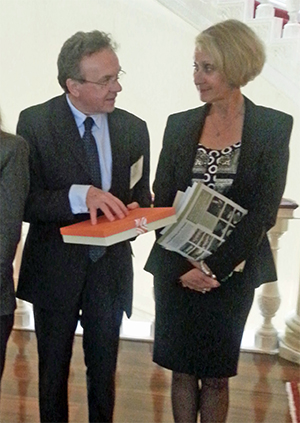
Randy Melzi concluded the event thanking those who took part in the panel and all those present, and declaring that she was impressed with the ‘Cultivating Good Water’ program because of its broad social and environmental scope.
Nelton Friedrich gave Randy Melzi a souvenir from Itaipu and invited her to get to know the ‘Cultivating Good Water’ program in person.
__________________________________________________________________________________________________________________

